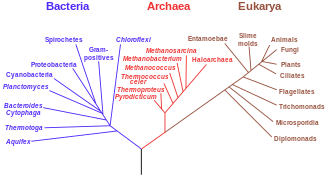Geobiology
Geobiology is an interdisciplinary field of scientific research that explores the interactions between the physical Earth, its biological components, and the environment. It combines principles and methodologies from geology and biology to understand how microbial life has influenced and been influenced by the Earth's geochemistry and geological processes over geological time scales. Geobiology often focuses on the study of microorganisms in their geological context, including their role in the formation and alteration of minerals and rocks, the cycling of elements and nutrients, and the history of life on Earth.
Overview
Geobiology examines the mutual relationships between the physical Earth and the biosphere, including how life processes affect the Earth's environment and vice versa. This field encompasses the study of fossils and the biological signatures left behind by ancient life forms, known as biomarkers, which can inform about the environmental conditions and biological activities of the past. It also involves the study of modern environments to understand how current biological processes can shape geological features and influence the geochemical cycles.
Key Areas of Research
Geobiology covers several key areas of research, including:
- Biomineralization: The process by which living organisms produce minerals, often leading to the formation of sedimentary rocks and other geological structures.
- Biosignatures and Biomarkers: Chemical, isotopic, or morphological signs that indicate the presence of life, past or present.
- Microbialites: Rock structures formed by the sediment trapping, binding, or precipitation activities of microorganisms.
- Extremophiles: Organisms that thrive in extreme environments, providing insights into the limits of life and the potential for life on other planets.
- Paleontology and Paleobiology: The study of ancient life and its interactions with the Earth's environment through the fossil record.
- Biogeochemical cycles: The cycling of elements and compounds through biological, geological, and chemical processes.
Importance
Geobiology has significant implications for various scientific disciplines. It helps in understanding the history of life on Earth, including the origins of life and the evolution of the atmosphere and oceans. By studying the interactions between life and the Earth's materials, geobiologists can also contribute to the fields of environmental science, climate change, and astrobiology, offering insights into how life might exist on other planets.
Challenges and Future Directions
One of the main challenges in geobiology is distinguishing between abiotic and biotic processes in the geological record, which requires interdisciplinary approaches combining geological, biological, and chemical analyses. Future research directions may focus on exploring the deep biosphere, understanding the role of microorganisms in climate regulation, and investigating the potential for life on other celestial bodies.
Transform your life with W8MD's budget GLP-1 injections from $125.
W8MD offers a medical weight loss program to lose weight in Philadelphia. Our physician-supervised medical weight loss provides:
- Most insurances accepted or discounted self-pay rates. We will obtain insurance prior authorizations if needed.
- Generic GLP1 weight loss injections from $125 for the starting dose.
- Also offer prescription weight loss medications including Phentermine, Qsymia, Diethylpropion, Contrave etc.
NYC weight loss doctor appointments
Start your NYC weight loss journey today at our NYC medical weight loss and Philadelphia medical weight loss clinics.
- Call 718-946-5500 to lose weight in NYC or for medical weight loss in Philadelphia 215-676-2334.
- Tags:NYC medical weight loss, Philadelphia lose weight Zepbound NYC, Budget GLP1 weight loss injections, Wegovy Philadelphia, Wegovy NYC, Philadelphia medical weight loss, Brookly weight loss and Wegovy NYC
|
WikiMD's Wellness Encyclopedia |
| Let Food Be Thy Medicine Medicine Thy Food - Hippocrates |
Medical Disclaimer: WikiMD is not a substitute for professional medical advice. The information on WikiMD is provided as an information resource only, may be incorrect, outdated or misleading, and is not to be used or relied on for any diagnostic or treatment purposes. Please consult your health care provider before making any healthcare decisions or for guidance about a specific medical condition. WikiMD expressly disclaims responsibility, and shall have no liability, for any damages, loss, injury, or liability whatsoever suffered as a result of your reliance on the information contained in this site. By visiting this site you agree to the foregoing terms and conditions, which may from time to time be changed or supplemented by WikiMD. If you do not agree to the foregoing terms and conditions, you should not enter or use this site. See full disclaimer.
Credits:Most images are courtesy of Wikimedia commons, and templates, categories Wikipedia, licensed under CC BY SA or similar.
Translate this page: - East Asian
中文,
日本,
한국어,
South Asian
हिन्दी,
தமிழ்,
తెలుగు,
Urdu,
ಕನ್ನಡ,
Southeast Asian
Indonesian,
Vietnamese,
Thai,
မြန်မာဘာသာ,
বাংলা
European
español,
Deutsch,
français,
Greek,
português do Brasil,
polski,
română,
русский,
Nederlands,
norsk,
svenska,
suomi,
Italian
Middle Eastern & African
عربى,
Turkish,
Persian,
Hebrew,
Afrikaans,
isiZulu,
Kiswahili,
Other
Bulgarian,
Hungarian,
Czech,
Swedish,
മലയാളം,
मराठी,
ਪੰਜਾਬੀ,
ગુજરાતી,
Portuguese,
Ukrainian
Contributors: Prab R. Tumpati, MD






